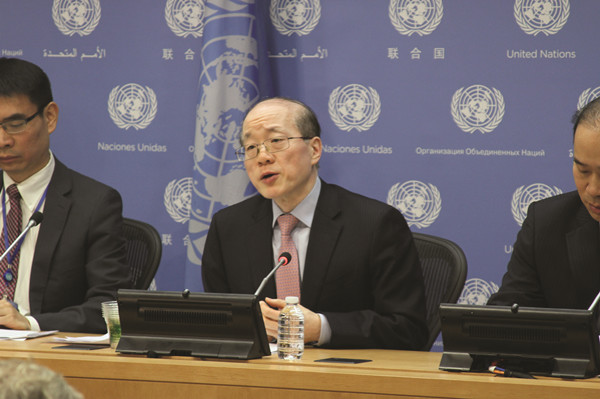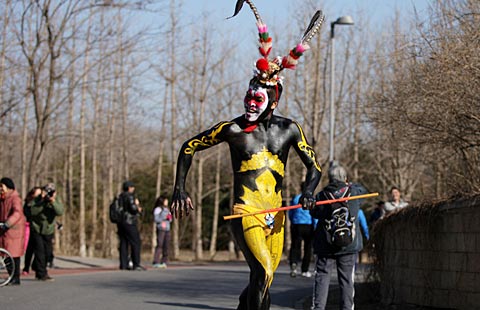China more proactive at UN
Updated: 2015-03-02 11:07
By Amy He at the United Nations(China Daily USA)
|
||||||||
 |
|
Liu Jieyi, China's permanent representative to the UN, speaks at a media briefing at the conclusion of the country's February presidency at the Security Council. Amy He / China Daily |
The UN Security Council has accomplished its tasks "smoothly" for February due to the joint efforts of all council members, and China has delivered on its promise as the presiding president of the council for the month, said Liu Jieyi, China's permanent representative to the world body.
"As I indicated at the beginning of the month, the Chinese presidency was guided in its work by being objective, impartial, efficient, result-oriented, open and transparent. We worked closely with other council members to fulfill the duties of the Security Council for the month, and by and large, the work of the council has been accomplished in a smooth way," Liu said at a media briefing at the conclusion of China's presidency on Friday at the United Nations.
The council held 20 public meetings and 15 informal consultations to consider agenda items on Syria, Palestine, Iraq, Yemen, Libya, Kosovo, Guinea Bissau, Somalia, Abyei, South Sudan and Ukraine.
Seven resolutions and two presidential statements were adopted, and 14 press statements were issued. Resolutions are voted on, while presidential statements reflect consensus, and are entered as official UN documents.
China made an effort to improve the council's working methods by communicating with the General Assembly to ensure that the council's and assembly's work were "mutually reinforcing" and that the council's decisions would reflect the rest of the UN membership, said Liu
He said that the China tried to "reach out more to countries whose challenges are addressed by the Security Council and also to sub-regional organizations and regional organizations. We intended to do this so as to place the work of the Security Council on a wider basis in the council's decisions and deliberations, just to reflect more of the views of the wider membership of the United Nations."
The highlight of China's presidency was the open debate held on the maintenance of international peace and security, a debate chaired by Chinese Foreign Minister Wang Yi on Feb 23.
"We see that as one event in a series of important events leading to the commemoration in September," Liu said.
It was the first time that a Chinese foreign minister presided over a Security Council meeting since the People's Republic of China won its seat at the UN in 1971.
Wang reminded member nations of their pledge to the goals and principles of the UN Charter and urged them to explore effective ways to maintain international peace and security under a new global situation in order to build a new type of international relationship based on win-win cooperation.
Representatives from 84 member states spoke, and Secretary-General Ban Ki-moon gave a briefing at the debate to more than 10 ministers and vice-ministers who attended the session.
Member states expressed "appreciation for China's initiative" in holding the debate that focused on looking back on history and taking stock of the future, in commemoration of the 70th anniversary of the founding of the UN and the 70th anniversary of the victory over fascism, Liu said.
"China hoped to work with the international community to send a clear message through the meeting, a message of upholding the spirit of the UN Charter, of the need to add new dimensions to it, and of the importance to foster a new type of international relations centering on win-win cooperation and reinforce the collective security mechanism set forth by the charter for common security," Liu said.
"Many countries stated that the hard-won victory of the Second World War belongs to all mankind. The hard lessons learned from the war have made it clear that only by remembering history can one assume greater responsibility for the maintenance of international peace and security," said Liu.
Last Thursday, the UN General Assembly adopted a resolution on the 70th anniversary of the end of WWII, calling upon all UN member states not to forget the tremendous sacrifices made and the horrendous atrocities committed during the war.
China has been playing a constructive role in solving major regional hot-button issues.
On Syria, Wang proposed that the issue be resolved by political means, and that the future of the country be decided by its own people. Furthermore, an "inclusive political process must be promoted", national unity must be achieved, and humanitarian assistance must be delivered to Syria and its neighboring countries, he said.
On counterterrorism, the council adopted Resolution 2199 to intensify sanctions against relevant terrorist groups, which would cut off their funding channels.
"This resolution reflects the international consensus on counter-terrorism and calls for greater international coordination and cooperation," Liu said. "China actively participated and played a constructive role in the consultations on the draft resolution. China opposes terrorism in all its forms and manifestations." China has long called for abandoning double standards in the war on terror.
"The current international situation is fluid and complex. Global challenges of various kinds are gaining greater prominence. Against this backdrop, China will stay committed to multilateralism and multilateral mechanisms," Liu said.
Xin Wengao contributed to the story.
amyhe@chinadailyusa.com
- Legislative, advisory assemblies clean house
- Reserves expanded to protect panda's habitats
- Sport chiefs to press ahead with soccer reforms
- Visitors enjoy cherry blossom in a park in SW China's Yunnan
- Death toll rises to 9 in Shenzhen airport car accident
- Reporters receive accreditation for 'two sessions'

 Monkey king, angel and superwoman at Beijing's 'naked run' race
Monkey king, angel and superwoman at Beijing's 'naked run' race
 Red-crowned cranes in Yancheng
Red-crowned cranes in Yancheng
 Prince William evokes Diana memories on Japan tsunami trip
Prince William evokes Diana memories on Japan tsunami trip
 Best times to view spring flowers in Beijing
Best times to view spring flowers in Beijing
 Dragon boat race to celebrate Chinese New Year in Sydney
Dragon boat race to celebrate Chinese New Year in Sydney
 South Pole setting for wedding photos, penguins included
South Pole setting for wedding photos, penguins included
 Milan Fashion Week - Autumn/Winter 2015-16
Milan Fashion Week - Autumn/Winter 2015-16
 Russian opposition leader Nemtsov shot dead in Moscow
Russian opposition leader Nemtsov shot dead in Moscow
Most Viewed
Editor's Picks

|

|

|

|

|

|
Today's Top News
US policy focused on Asia: official
China more proactive at UN
Cooperation potential called 'limitless'
Homeland Security funding drama darkens US fiscal outlook
17th Apple retail store in Chinese mainland opens in Shenyang
PBOC cuts rates to ease business financing
Former celebrity TV anchor on crusade against pollution
China ends UN council presidency
US Weekly

|

|







